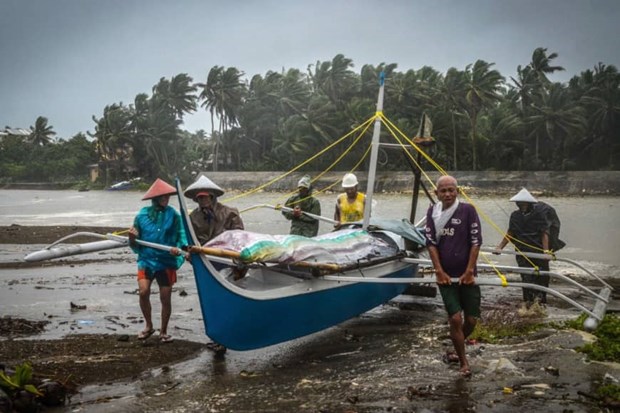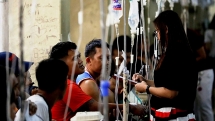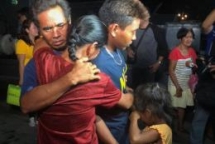Typhoon Phanfone wreaks havoc in Philippines on Christmas
 |
Fishermen carry a boat to higher ground in Baybay, eastern Samar on December 24 after typhoon Phanfone hit the central Philippines (Source: AFP)
According to the National Civil Defense Administration of the country, tens of thousands were stranded at shuttered ports or evacuation centres at the height of the festive season.
More than 10,000 people spent the night in improvised shelters in schools, gyms and government buildings as the typhoon made landfall, a civil defense official said.
Meanwhile, the local coast guard said that more than 25,000 people remained stranded at ports on Christmas Day with ferry services still shut down.
The typhoon destroyed houses, toppled trees and blacked out cities in the Philippines’ most storm-prone region. Many domestic flights have been canceled or delayed.
No causalities have been confirmed but rescuers said they have yet to reach the more isolated areas, some in neck-deep floods.
Though weaker, Phanfone was tracking a similar path as Super Typhoon Haiyan — the deadliest cyclone on record in the Philippines, which left more than 7,300 people dead or missing in 2013.
The typhoon is forecast to sweep across many islands in the nation with strong winds and heavy rain before moving toward the East Sea early December 26.
The Philippines gets hit by an average of 20 storms and typhoons each year, killing scores of people and wiping out harvests, homes and other infrastructure./.
Recommended
 World
World
US, China Conclude Trade Talks with Positive Outcome
 World
World
Nifty, Sensex jumped more than 2% in opening as India-Pakistan tensions ease
 World
World
Easing of US-China Tariffs: Markets React Positively, Experts Remain Cautious
 World
World
India strikes back at terrorists with Operation Sindoor
Popular article
 World
World
India sending Holy Relics of Lord Buddha to Vietnam a special gesture, has generated tremendous spiritual faith: Kiren Rijiju
 World
World
Why the India-US Sonobuoy Co-Production Agreement Matters
 World
World
Vietnam’s 50-year Reunification Celebration Garners Argentine Press’s Attention
 World
World










